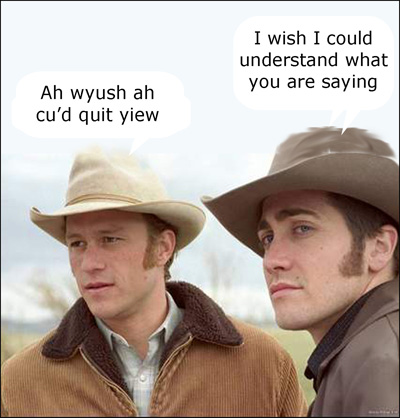 Annie Proulx, who seems to love writing about people dealing with a lot of internal torment, let some of her own out when the movie based on her short story did not win the Academy Award for “Best Picture”. Proulx earned an SLB degree to put after her unpronounced “lx” for being a “Spoiled Literary Bitch” when she trashed Crash for being selected over Brokeback Mountain . C’est la cinema , Proulx.
Annie Proulx, who seems to love writing about people dealing with a lot of internal torment, let some of her own out when the movie based on her short story did not win the Academy Award for “Best Picture”. Proulx earned an SLB degree to put after her unpronounced “lx” for being a “Spoiled Literary Bitch” when she trashed Crash for being selected over Brokeback Mountain . C’est la cinema , Proulx.
My Netflix Brokeback Mountain arrived yesterday. I felt obliged, having written about its implications in an earlier essay, more than interested to watch it. Two cowboys go sheep-herding in the high pastures of Montana, and I couldn’t keep a hilarious scene from Jim Jarmusch’s Night of Earth , in which Roman taxi driver Roberto Benigni, confesses that he has fallen in love with a sheep to a priest in the back seat who is dying of heart failure (it’s the sheepophilia, not the heart failure that is hilarious). Brokeback Mountain has received a lot of acclaim, but also has been the butt (see?) of a lot of jokes.
Angst Lee (sorry, couldn’t resist it) received a “Best Director” award for his part; but I didn’t see anything excdeptional in direction here (does this mean we might soon see Crouching Dragon Mounting Tiger?) . He may have a facility with getting two straight actors to play two gay cowboys who keep returning to the mountain to carry on their affair even after they have married and fathered children. Their phony “fishing trips” go on for years, but the only way we know that they must be getting older is that their kids are growing up. Jake Gyllenhaal (Jack) grows a mustache and gets a slight paunch. Heath Ledger (Ennis), who was nominated for a “Best Actor” award only seems to “age” by becoming more inaudible as the movie goes on. He starts out mumbling his dialog, presumably to give him an aw-shucks taciturn cowboy demeanor. By the end he looks like a guy practicing ventriloquism; he barley moves his lips and his words are indecipherable, and there were precious few lines of dialog for him to deliver. (The Academy Award went to a guy playing a gay who sounded like Daffy Duck.)
Neither of these cowboys is particularly likeable or depthful, but then they don’t appear to like themselves either. They seem mainly interested in rolling around together in meadows and bemoaning that they have wives and families that keep them apart. Right-wingers will get a double whammy from this film: guys living in homosexual debauchery and wrecking their families into the bargain. (See, homosexuals are making war on the American family.)
Still there is something moving and meaningful going on is this film. There is lust, and maybe love, or maybe just the need for friendship with someone who “understands” what is so difficult to understand. It’s hard to parse out, even for the two cowboys. It is a romantic film in the sense that they respectively and reciprocally are ready to risk everything for something not that they have, but has them . Homophobes won’t care to see it that way; they like seeing this stuff as a chosen (sinful) “lifestyle” for which these guys will burn in hell.
They pay a bigger price than that. Ennis moans that every look he gets, even from strangers, seems to be a “knowing” look. Wives are even harder to deceive, and they are played with appropriate nuance by Anne Hathaway and Michelle Williams. We know that they know, without ever saying so.
So will they ride off into the sunset over Brokeback Mountain , or not? It is the 1980s near the denouement of their two-decade affair, but neither seems to be inclined to decamp for the anonymity and more favorable social setting of San Francisco or New York, preferring to fantasize about setting up a ranch together somewhere. But then Ennis has that recurring flashback of when his father made him look at the bodies of two old gay cowboys that were beaten to death and dumped in a ditch. They’re stuck, and starting to take things out on one another when one another is getting to be about all they have left.
I think that’s where Brokeback Mountain got its appeal. If it were only a “gay film,” or a film that appealed to what right-wingers would see as a homage to “those Hollywood fags and liberals,” or only a film with two A-list male actors kissing on screen, I don’t think it would have amounted to much. But, in the end, these two icons of American rugged individuality can only be what they are, or at least what they feel, in the outback of Brokeback Mountain. Homophobes may hate the film for impugning a sacred American myth, but if they bother to see it, they might also realize that it is about two, scared, trapped people.
Perhaps the best scene is when Ennis visits Jack’s parents after the latter’s death. By now we are wondering whether the parents “know,” too. There is a palpable sense of personal desolation in Ennis’ visit to Jack’s room, as well as the sense that this is where Ledger earned his nomination, and Ang Lee has earned his “Angst.” By this time I had even put down that magazine I was using to flip through during those scenes of two guys kissing.
___________________________________
©2006, James A. Clapp (UrbisMedia Ltd. Pub. 5.19.2006)
